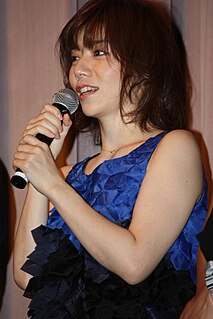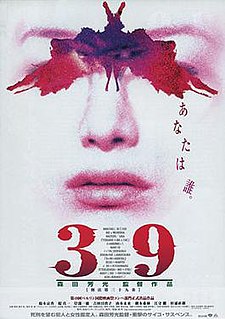
Jun Shibata, nicknamed "Shibajun", is a Japanese pop female singer-songwriter. In 2016 she was diagnosed with partial hearing loss.

Oichi was a female historical figure in the late Sengoku period. She is known primarily as the mother of three daughters who became prominent figures in their own right – Yodo-dono, Ohatsu and Oeyo. Oichi was the younger sister of Oda Nobunaga; and she was the sister-in-law of Nōhime, the daughter of Saitō Dōsan. She was descended from the Taira and Fujiwara clans.

Choudenshi Bioman is Toei Company's eighth installment in the Super Sentai metaseries. Its 51 episodes aired on TV Asahi from February 4, 1984 to January 26, 1985 with a movie being released during the show's initial run.

The Netherlands Indies gulden, later the Netherlands Indies roepiah, was the currency issued by the Japanese occupiers in the Dutch East Indies between 1942 and 1945. It was subdivided into 100 sen and replaced the gulden at par.
Tetsuya Shibata is a Japanese video game music composer and sound director. He is credited for over twenty musical scores produced for Capcom's video game releases including the Monster Hunter and Devil May Cry series, as well those in the Darkstalkers, Power Stone and Resident Evil Outbreak series. His later works with the company involved organizing orchestral recordings for Resident Evil 5 and Monster Hunter Tri. In 2009, Shibata left Capcom and began his own music studio, known as Unique Note, with colleague Yoshino Aoki.
Tokio Private Police is a hentai anime series set in the future, and centres on a mechanised platoon of a private security firm.
Unsolved Cases is a Japanese mystery thriller created first as a TV drama and later as a film. It is about Detective Jun Shibata, who handles unsolved cases with her hardened partner Tōru Mayama.

Oort no Kumo is Jun Shibata's 1st studio album. It was released on 20 March 2002 and peaked at #59 in the Oricon Weekly Albums Chart.

Watashi (Me) is Jun Shibata's fourth and last studio album with Dreamusic. It was released on March 30, 2005 and peaked at number 6 in Japan.
Sore Demo Kita Michi is Japanese singer Jun Shibata's 2nd single. It was released on February 20, 2002 and peaked at #90.
"Maboroshi"/"Okaerinasai." is Jun Shibata's 11th single and second recut. It is also her first double A-side single as well as her last with Dreamusic. It was released on May 8, 2005 and peaked at #30.
"Hiromi" is Jun Shibata's 14th single and first to break into the Top 5. It was released on January 11, 2007 and peaked at #5. A short film starring Shibata herself was also based on this song.

Day/night cricket, also known as floodlit cricket, is a cricket match that is played either totally or partially under floodlights in the evening. The first regular cricket to be played under floodlights occurred during World Series Cricket, unsanctioned by the International Cricket Council (ICC), attracting large crowds to see some of the world's best players compete in Australia and the West Indies. In 1979, when the ICC and World Series Cricket came to an understanding, the first floodlit One Day International was played, also in Australia. Floodlit cricket has since been played around the world, although England was slow to take it up due to their climate. Floodlit first-class cricket was first played in 1994, when the concept was tried during the Sheffield Shield. Day/night cricket is now commonplace in one-day cricket and Twenty20 cricket. For instance, all 27 matches in the 2014 ICC World Twenty20 were day/night matches, as were most matches in the 2011 Cricket World Cup.

Keiho is a 1999 Japanese film directed by Yoshimitsu Morita.
Crayon Shin-chan: Pursuit of the Balls of Darkness, also known as Dark Tamatam Thrilling Chase!, is a 1997 Japanese animated film and the fifth installment of the Crayon Shin-chan series. It was released in India on June 17, 2012 as Shin Chan in Dark Tama Tama Thrilling Chase and aired on Hungama TV. It was released as Crayon Shinchan The Movie: The Dark Ball Chase with English subtitles on VCD by PMP Entertainment.
Derbyshire County Cricket Club in 1900 was the cricket season when the English club Derbyshire had been playing for twenty-nine years. It was their sixth season in the County Championship and they won three matches to finish thirteenth in the Championship table.
Taiyō ni Hoero! (太陽にほえろ!), literally Roar at the Sun, was a long-running prime-time television detective series in Japan, which ran from 1972 to 1986 for a total of 718 episodes. The lead star was Yujiro Ishihara. It also helped further the career of actors such as Yūsaku Matsuda and Kenichi Hagiwara as well as Hiroshi Katsuno and Masaya Oki. It was a police procedural set mostly in a police station. It was one of the most popular and iconic detective dramas in Japanese television history. A sequel was aired from 1986 to 1987, airing for 12 episodes.
Hidetsugu Shibata is a Japanese comedian.
This page is based on this
Wikipedia article Text is available under the
CC BY-SA 4.0 license; additional terms may apply.
Images, videos and audio are available under their respective licenses.








